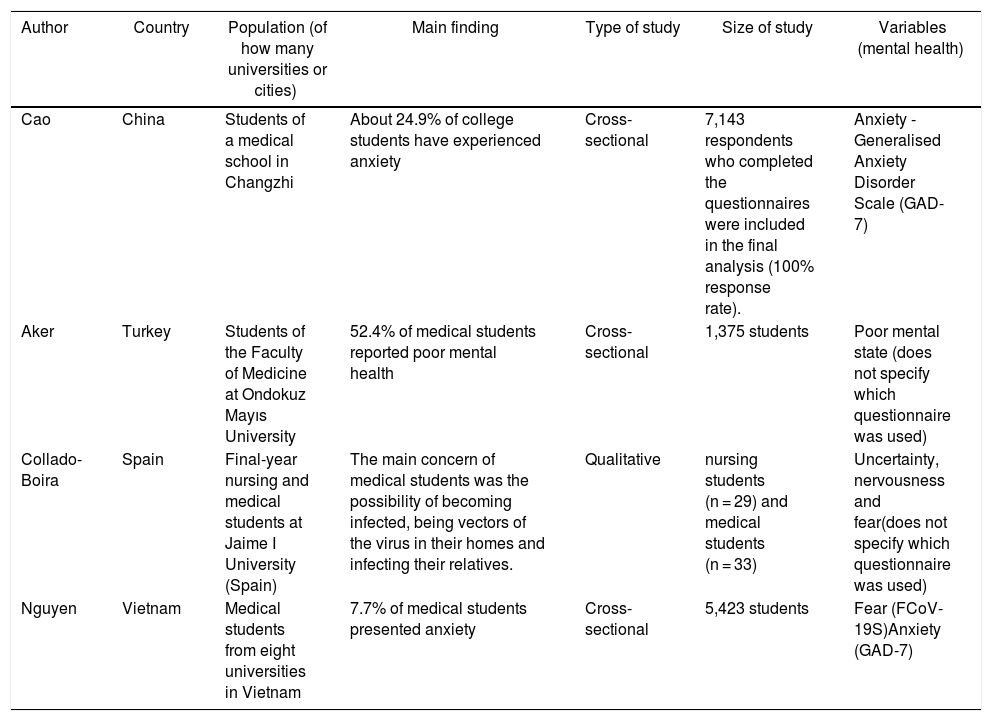While the COVID-19 pandemic is affecting people's mental health in general, certain groups could be particularly affected. One of these groups would be medical students, who not only suffer from the usual stressors due to this new context, but have also seen their placements in health institutions delayed, will be exposed to significant risk when they start these again. and are being forced to modify their professional development plan.1
Considering the current context, to better train future doctors, it is important to investigate what impact the COVID-19 pandemic is having on their mental health, as well as what interventions can be implemented to minimise this impact. Therefore, the objective of this letter is to describe the research carried out on the mental health of medical students in the context of the COVID-19 pandemic.
On 21 June 2020, a search was carried out in PubMed with the strategy: [covid 19 "medical students'']. Studies were selected and their data extracted in duplicate. Of the 106 articles found, only 4 met our inclusion criteria. The selected articles were from China, Turkey, Spain and Vietnam. These studies were conducted between March and April 2020. Three are cross-sectional quantitative studies and one is qualitative. These studies evaluated anxiety, poor mental health, worries and fear (Table 1).
Characteristics of the studies found.
| Author | Country | Population (of how many universities or cities) | Main finding | Type of study | Size of study | Variables (mental health) |
|---|---|---|---|---|---|---|
| Cao | China | Students of a medical school in Changzhi | About 24.9% of college students have experienced anxiety | Cross-sectional | 7,143 respondents who completed the questionnaires were included in the final analysis (100% response rate). | Anxiety - Generalised Anxiety Disorder Scale (GAD-7) |
| Aker | Turkey | Students of the Faculty of Medicine at Ondokuz Mayıs University | 52.4% of medical students reported poor mental health | Cross-sectional | 1,375 students | Poor mental state (does not specify which questionnaire was used) |
| Collado-Boira | Spain | Final-year nursing and medical students at Jaime I University (Spain) | The main concern of medical students was the possibility of becoming infected, being vectors of the virus in their homes and infecting their relatives. | Qualitative | nursing students (n = 29) and medical students (n = 33) | Uncertainty, nervousness and fear(does not specify which questionnaire was used) |
| Nguyen | Vietnam | Medical students from eight universities in Vietnam | 7.7% of medical students presented anxiety | Cross-sectional | 5,423 students | Fear (FCoV-19S)Anxiety (GAD-7) |
The Chinese study reports that academic delays and changes in routine and daily family income have an impact on students' mental health.2 The Turkish study finds worries about the future.3 The Spanish qualitative study finds worries about the lack of personal protective equipment (PPE) and not having enough knowledge on how to use it, and fear of getting infected and infecting family members.4
It is observed that there are still few studies on the mental health of medical students in the context of COVID-19. Longitudinal studies have not been found showing how mental health variables have changed before and after the COVID-19 pandemic began. Similarly, no experimental studies that are necessary to evaluate interventions aimed at improving the mental health of medical students have been found, although there are experimental studies of university students in general, using mindfulnesss,5 positive psychology programmes6 and other virtual interventions7,8 in the context of COVID-19. It remains to be seen whether these programmes would also be useful for medical students.
In the current context, it is important to rethink medical education not only to train professionals with the necessary skills, but also to minimise the potential harmful impacts of suboptimal mental health in those who are in training. Research on the mental health of medical students can help better decisions to be made in this regard and should be encouraged.
Please cite this article as: Morote-Jayacc PV, Sandoval KD, Moreno-Molina M, Taype-Rondan Á. Estudios de salud mental en estudiantes de Medicina en el contexto de la COVID-19. Rev Colomb Psiquiat. 2020;49:223–224.






